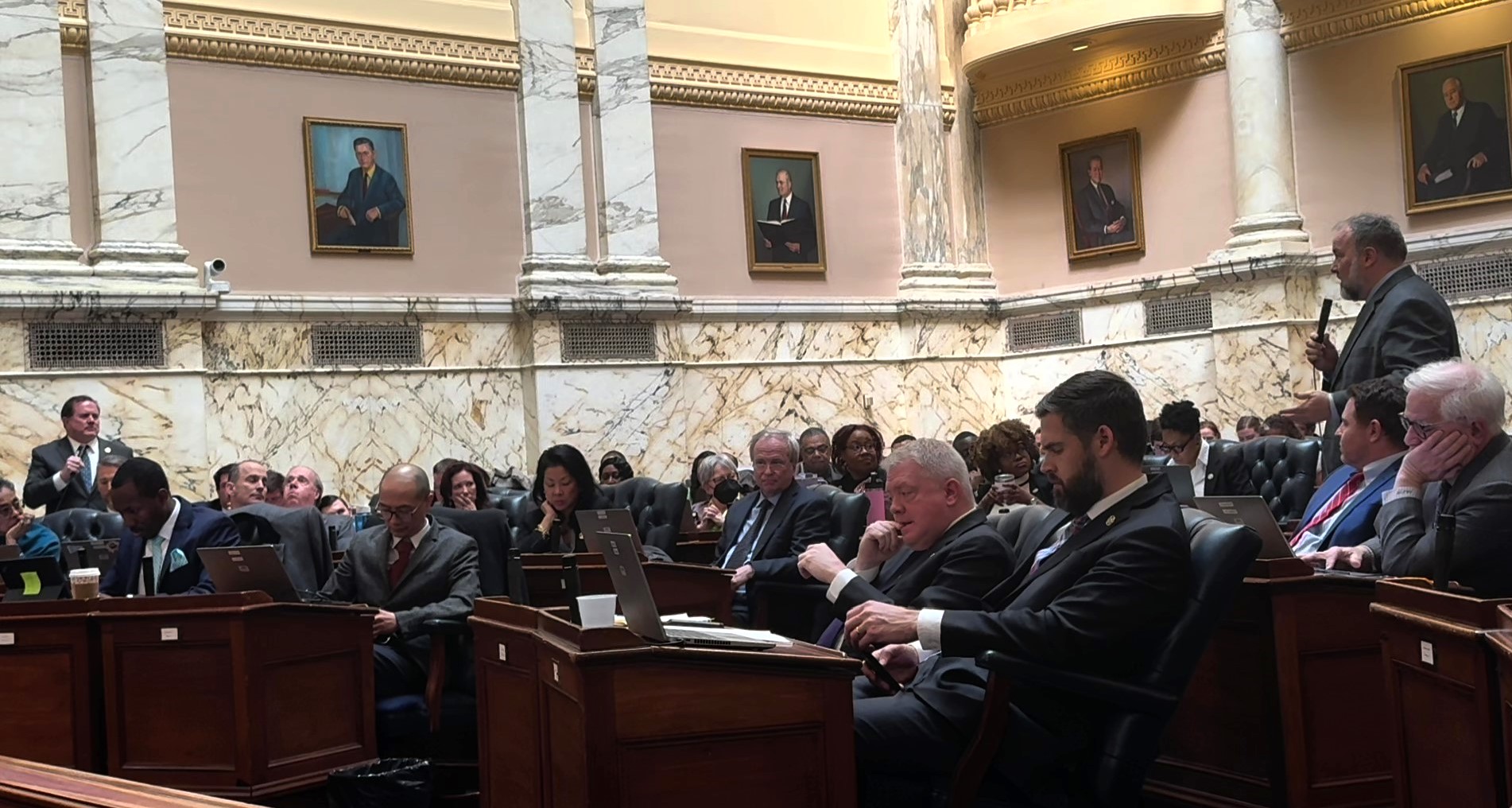Legislative Notes: House approves juvenile justice bill after fiery debate, aid-in-dying stalled, electricity bill advances

The Maryland House of Delegates gave overwhelming final approval Friday to its version of a juvenile justice reform measure that aims to combine accountability and rehabilitation.
The vote on House Bill 814 was 126-6, with all the dissenting votes coming from liberal Black Democrats.
The bill would require the state Department of Juvenile Services (DJS) to complete a three-year plan that includes programs for youth who are “at the highest risk of becoming victims or perpetrators of gun violence.” The bill designates that those programs would be targeted for youth ages 10 to 14.
The bill would also require children ages 10 to 12 to enter a mandatory diversion program if a first-time arrest involves a car theft or certain firearm offenses.
A Commission on Juvenile Justice Reform and Emerging and Best Practices must complete tasks such as reviewing the department’s education and diversionary programs, researching evidence-based programs and reviewing deaths that involve children under the supervision of DJS.
“We better be committed to what that commission is supposed to do,” said Del. Cheryl Pasteur (D-Baltimore County), who voted for the bill.
Del. Ric Metzgar (R-Baltimore County) referenced food to describe his support of the bill.
“I’d rather have a piece of pie than no pie at all. This [bill] doesn’t go all the way but it’s a great start,” he said. “We need to protect our young people.”
The six lawmakers who voted against the measure were Dels. Gabriel Acevero (D-Montgomery), Tiffany Alston (D-Prince George’s), Debra Davis (D-Charles), Ashanti Martinez (D-Prince George’s), Jamila Woods (Prince George’s) and Caylin Young (D-Baltimore City).
Young said the bill doesn’t come from a restorative justice approach.
“We know the population that’s going to be most impacted is young, Black boys,” he said.
A racial equity impact note states the bill would create both positive and negative impacts on juvenile services intakes and “likely affect Black youth to the greatest extent as they are significantly overrepresented in DJS custody.”
Davis said she stands with criminal justice advocates who also don’t support the measure, such as the ACLU of Maryland, which released a highly critical statement after the vote.
“We applaud the six brave delegates who resisted a bill that has been driven by media propaganda and not rooted in best practices or actual data,” said Yanet Amanuel, public policy director for the ACLU. “We need our elected leaders to center the humanity of Black children and prioritize care over cages.”
The House version heads over to the Senate, which could grant final approval on its version of the legislation on Monday night.
Aid-in-dying dead
During a briefing Friday with reporters, Senate President Bill Ferguson (D-Baltimore City) said the highly controversial medical aid-in-dying legislation will not come up for a vote this year.
“It does not appear we have the votes to pass it in the Senate,” he said. “I know it will be disappointing to a number of folks, but if the votes aren’t there, the votes aren’t there. We will continue in the education process and take it up at a different time when we think there’s a better chance for its passage.”
Senate Bill 443 (End of Life Option Act) sponsored by Sen. Jeff Waldstreicher (D-Montgomery) was bottled up in the Senate Judicial Proceedings Committee. He serves as the committee’s vice chair.
Committee Chair William C. Smith Jr. (D-Montgomery), who joined Ferguson at the the briefing, said it was about one or two votes shy of passing in Judicial Proceedings.

Senate Judicial Proceedings Chair Sen. William C. Smith Jr. (D-Montgomery). Photo by Bryan P. Sears.
“As folks got closer to the vote and had more in-depth discussions with their constituents, folks expressed unreadiness to move on it at this time,” he said. “I’m actually very disappointed, but have to respect the decisions of the individual senators who are listening to their constituents and listening to their conscience.”
Del. Joseline A. Peña-Melnyk (D-Prince George’s and Anne Arundel), chair of the House Health and Government Operations Committee, has said the House version won’t receive a vote unless the Senate bill advances.
The legislation’s most successful run came five years ago when the House voted for it 74-66. However, it was tied 23-23 in the Senate after former Sen. Obie Patterson from Prince George’s County withheld his vote.
Conversations around medical aid-in-dying legislation are sensitive and highly emotional.
“On issues like this that it’s a vote of conscience and so personal,” Smith said.
Two affiliated advocacy groups, Compassion & Choices and Compassion & Choices Action Network, released a statement Friday afternoon urging the committee to vote.
“We cannot express how disappointed we are that the legislature once again may not pass the End-of-Life Option Act because of one senator,” said Donna Smith, Maryland campaign director for Compassion & Choices Action Network. “It has been nine years since this bill was first introduced in 2015. Every year, I attend funerals of terminally ill advocates who desperately plead with lawmakers to pass this compassionate legislation and then they die in needless agony because they didn’t pass it.”
SB 1 gets first vote
The Maryland Senate is moving closer to updating the state’s quarter-century-old rules governing the competitive marketplace for retail electricity.
After two days of discussion, the Senate Committee on Education, Energy and the Environment voted 8-2 late Friday to advance Senate Bill 1 to the Senate floor.
The General Assembly in 1999 passed a law that enables energy suppliers to compete with monopoly utilities for the right to sell electricity to ratepayers. The utilities continue to distribute the energy, regardless of its origin.
Under that law, the utilities become the default energy supplier unless the state’s electric customers choose to buy power from suppliers. But the marketplace, fairly or not, has largely been defined by aggressive and sometimes predatory sales pitches that especially target low-income ratepayers with offers that can sound too good to be true and often result in higher rates than if the customers had stuck with utilities as suppliers. So powerful lawmakers have vowed to finally do something about it this year.
SB 1 would change the state’s current regulatory scheme in several meaningful ways. It would require people who sell electricity service to obtain a state license, good for three years, and lays out guidelines for qualifying for the license and metes out punishment for those who break the rules.
However, one of the amendments that the Senate committee adopted this week strips fines away from individual salespeople and instead levies fines for violating the law on the companies that hire them.
“The amendments really refine where we started,” the bill’s sponsor, Sen. Malcolm Augustine (D-Prince George’s), told his colleagues Friday. “It really does protect Marylanders. But it also lays a foundation for a green energy market to grow.”
Just as the bill is likely to move in the Senate next week, its House companion, HB 267, is also like to get a favorable reception in the House Economic Matters Committee, whose vice chair, Del. Brian Crosby (D-St. Mary’s), is the chief sponsor.
But energy suppliers are already prepared to attack. No sooner did the Senate committee vote Friday then the Choose Who You Use Coalition, funded by NRG and other big companies, starting tweeting its thanks or condemnation of the committee members, depending on how they voted. The two “nay” votes, by the way, were from the two committee Republicans present, Sen. Mary Beth Carozza (Lower Shore) and Sen. Jason C. Gallion (Harford and Cecil).
This story has been corrected to reflect that a quote about the juvenile justice bill was made by Del. Ric Metzgar (R-Baltimore County).





 Creative Commons Attribution
Creative Commons Attribution